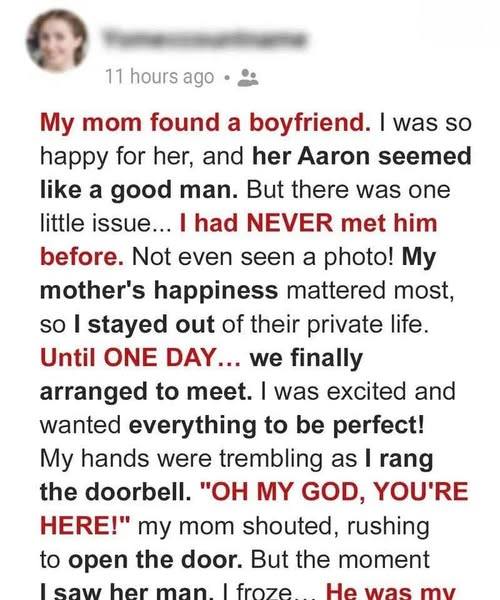Still, I tried to keep an open mind. The truth is, Aaron made it hard not to. He showed up early, stayed late, helped my mom with groceries and house repairs. He was attentive without being clingy, thoughtful without being performative. He worked long hours but never missed a date with her. And yet the age gap gnawed at me. His kindness felt almost… curated. I couldn’t shake the sense that he was trying too hard.
When they got engaged eight months in, my mother was glowing. I tried to be happy for her — really tried — but the unease didn’t go away. So I did what anxious people do: I watched, quietly, obsessively, waiting for the other shoe to drop.
It finally did, but not the way I expected.
A week before the wedding, my mom asked me to help organize some documents — insurance, mortgage adjustments, and the usual pre-marriage legal clutter. While sorting through a stack of folders on her desk, I found one that was locked with a simple password. Not unusual by itself, but out of place among the others. I stared at it, debating whether to ignore it. Then fear won.
The folder wasn’t encrypted well. My mom is a genius in many ways, but not technologically subtle. When it opened, I expected to find something about her finances. Instead, I found pages of debt — big numbers, all tied to Aaron’s name. Not student loans. Not business investments. Actual debt.
And beneath the loan statements, a property deed.
Registered to my mother.
My stomach dropped. The math in my head formed a picture I didn’t want to see but couldn’t avoid: a younger man drowning in debt, about to marry a woman with a home, a pension, and a stable life. A younger man who seemed too perfect.
A younger man who, in my panicked mind, finally made sense.
I didn’t confront my mom. I should have. Instead, I stewed for 48 hours, imagining every worst-case scenario. By the time the wedding rehearsal came around, I was wound so tight the smallest thing could’ve set me off. And something did.
Maybe it was the sight of them standing together at the altar, her eyes filled with joy while he looked relaxed, confident, entirely at ease. Maybe it was the way he slipped his arm around her like he belonged in her life more than I did. Whatever the trigger was, I snapped.
In the middle of the rehearsal, in front of guests, family, friends, and an absolutely horrified pastor, I accused him of using my mother for her money. I listed the debts. I mentioned the deed. My voice was shaking, but loud, too loud, echoing off the walls. My mom’s face drained of color. Everyone froze.
Aaron didn’t shout back. He didn’t even defend himself immediately. He just closed his eyes for a moment like he was bracing for impact.
Then he explained.
Calmly. Clearly. Without anger.
The debts weren’t his personal spending. They were loans he’d taken out to help my mother buy something — not for her, but for me. A small restaurant. The kind of place I’d dreamed of owning someday, the dream I’d buried under excuses about timing, responsibility, and money.
He had planned to work there too, as her pastry chef, building something the three of us could share as a family. The deed was in my mother’s name because he wanted the restaurant to belong to her — and eventually, to me — not tied up in anything he owned.
I felt the shame immediately, like a physical weight dropping onto my chest. My mother’s tears weren’t angry. They were hurt. Deeply hurt. It wasn’t just that I had embarrassed her — it was that I didn’t trust her. Or him. Or the life she was choosing.
She had finally found something soft, something warm, something healing — and I had nearly shattered it out of fear.
After everyone left, I apologized until I ran out of words, and still, it didn’t feel like enough. My mother took my hands and squeezed them, her voice gentle.
“I know you meant to protect me. But sometimes, love needs space, not shields.”
That sentence has stayed in my head ever since.
We talked for hours that night. She told me how Aaron made her feel young again, not in the superficial way, but in the sense that life held possibilities again. He listened to her stories, her worries, her dreams. He treated her like someone whose best years weren’t behind her. And she was right — I hadn’t trusted her to make choices for her own life.
I’d acted like her protector, but really, I’d acted like her jailer — guarding her from heartbreak so tightly that I nearly became the cause of it.
The next morning, I apologized to Aaron. He forgave me immediately. Not because I deserved it, but because, in his words, “You love her fiercely. That’s the kind of family I want.”
The wedding happened a week later. I stood beside my mother, steady and proud this time, not because I was convinced everything would be perfect but because I finally understood something important:
Love isn’t defined by age. It’s defined by intention. By honesty. By how two people show up for each other when no one else is watching.
I almost ruined something good because of my fear. But that disaster taught me the one thing I needed to learn:
Protecting someone doesn’t always mean shielding them. Sometimes it means trusting them. Trusting their heart. Trusting their choices. Trusting that they deserve every bit of happiness they find, even if it looks nothing like what we expect.
My mom found love at 45. Real love. And the truth wasn’t what broke us — it was what rebuilt us.
And thank God I learned that before it was too late.

